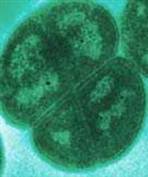| ZAGREB - Croatian scientists have worked out how a radiation-resistant bacterium that can exist in extreme conditions repairs damage to itself, a discovery which could provide clues about diseases such as cancer. "Through evolution, the bacteria have developed a mechanism to precisely reconstruct its DNA. Until now this has been a scientific riddle," Ksenija Zahradka, a leading researcher in the study, told a news conference. |  |

By Igor Ilic
ZAGREB (Reuters) - Croatian scientists have worked out how a radiation-resistant bacterium that can exist in extreme conditions repairs damage to itself, a discovery which could provide clues about diseases such as cancer. The organism called Deinococcus radiodurans is so hardy it can survive ionizing radiation 5,000 times stronger than the level lethal to humans. "Through evolution, the bacteria have developed a mechanism to precisely reconstruct its DNA. Until now this has been a scientific riddle," Ksenija Zahradka, a leading researcher in the study, told a news conference. "It is an extremely fascinating phenomenon to see how a cell itself can repair its fairly destroyed DNA. We will use this knowledge to try to find ways how cells that are not so resistant could do the same." The scientists, whose findings were reported online by the journal Nature, described the two-stage method in which the bacterium rebuilds its genome.Many diseases including cancer involve alterations to DNA and an inability to recover from the damage. "Therefore, any understanding of self-repair mechanisms could help in that regard. Now we'll focus to see if there are other organisms which can do the same," Zahradka said. The study was completed in cooperation between the Croatian research institute Rudjer Boskovic and the Paris-based Necker Institute where Croat scientist Miroslav Radman supervised the experimental part of the study. Deinococcus radiodurans, which means strange berry that withstands radiation, was discovered 50 years ago in a can of spoiled meat. It can survive in deserts or on other surfaces exposed to strong heat where all other organisms perish because of dehydration and ultraviolet rays that shatter the cellular DNA into fragments.